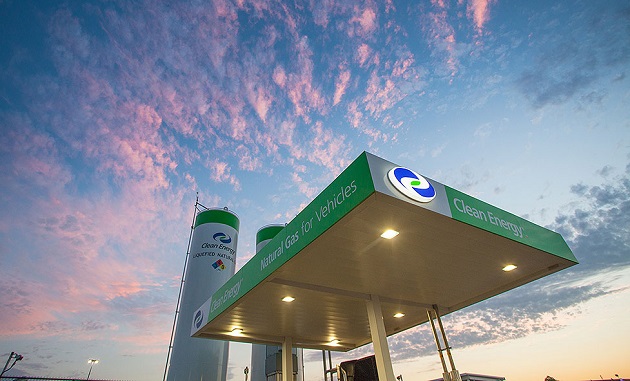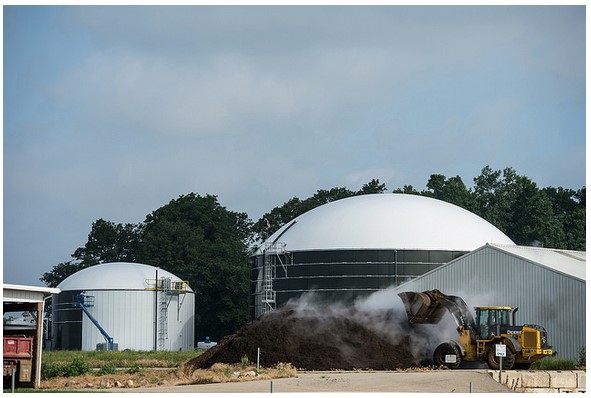New York and other cities across the U.S. and around the world are grappling with the imperative to cut greenhouse gas emissions and implement low-carbon energy and fuel systems. Whether the emission reduction goals are 30% by 2020, 50% by 2030, or 80% by 2050, leaders and climate experts agree: the time to act on climate… Keep reading →
Biomethane
Tapping the (Decomposing) Big Apple: NYC’s Organic Waste Is a Crucial Renewable Energy Resource
By Matt TomichSign up and get Breaking Energy news in your inbox.
We will never sell or share your information without your consent. See our privacy policy.Biomethane is a drop in the ocean of fuel used in the U.S. shipping industry now, but its prospects improved a bit on Tuesday with the announcement of an agreement by UPS to buy “renewable natural gas” (RNG) from Clean Energy Fuels, the natural-gas-for-transport company co-founded by T. Boone Pickens. UPS said that beginning this month, tractors and delivery… Keep reading →
The Renewable Energy Embraced by Traditional Fossil Fuel Industries: Renewable Natural Gas
By Edward DodgeThe Canadian Gas Association, a leading industry trade group, issued a report in December 2014 promoting renewable natural gas in Canada. Titled, “Renewable Natural Gas Technology Roadmap for Canada,” the report offers very aggressive support for biomethane production as a means to both reduce waste and greenhouse gases while developing an underutilized renewable resource. According… Keep reading →
This is the latest installment in our Energy Startup Series that gives executives at cutting-edge energy firms an opportunity to share insights and experiences about the energy industry, their careers and their companies. While working for the US Environmental Protection Agency (EPA), Olof Hansen was in charge of building public-private partnerships in waste minimization and pollution… Keep reading →
Renewable natural gas (RNG) is methane produced from biomass that is cleaned to pipeline quality standards and blended with fossil natural gas. RNG, also known as biomethane, is carbon-neutral and chemically identical to fossil natural gas allowing it to be blended without restriction. Renewable natural gas is produced from a variety of (mostly waste) resources… Keep reading →
Natural gas use is growing throughout the world as new drilling techniques open up vast shale and other tight resources. The result is low-cost gas flooding the market. The environmental advantages of natural gas over other fossil fuels have put it in a favored position as emissions regulations continue to tighten around the world. But conventional… Keep reading →
Following the Environmental Protection Agency’s (EPA) recent decision to emphasize the use of biogas in the Renewable Fuels Standard (RFS), the United States Department of Agriculture (USDA) has come out with their own Biogas Opportunities Roadmap to promote biogas as a valuable form of renewable energy. The USDA is working together with the EPA, the Department… Keep reading →
The EPA recently announced changes to the Renewable Fuels Standard (RFS2) that improves opportunities for biogas to be utilized as a vehicular fuel by qualifying it as an advanced cellulosic biofuel. Biogas-derived Compressed Natural Gas (CNG) and Liquefied Natural Gas (LNG) produced from landfills, municipal waste-water treatment facility digesters, agricultural digesters, and separated MSW digesters… Keep reading →
Renewable energy companies in the United States might lose a friend in the coming months. Conservative Republicans are trying to kill the Export-Import Bank, the independent and self-sustaining federal agency founded during the Great Depression that helps finance the purchase of American-made goods and services by overseas buyers. The bank’s current authorization expires at the… Keep reading →
Is the Renewable Fuel Standard broken beyond repair? It depends who you ask, but it’s certainly problematic. The RFS enforced by the EPA was originally envisioned as a way to get more biofuel into the US transportation fuel market, but changing technology and consumption patterns have required continual adjustments to the law. The EPA recently… Keep reading →










